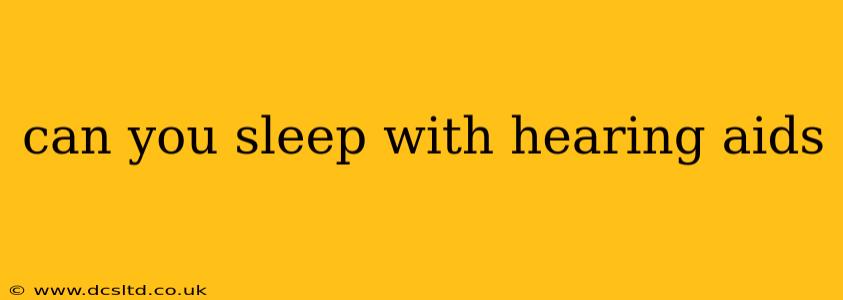Can You Sleep With Hearing Aids? A Comprehensive Guide
Sleeping with hearing aids is a question many hearing aid users ponder. The answer isn't a simple yes or no; it depends on several factors, including the type of hearing aid, your sleeping habits, and your individual comfort level. Let's delve into the details to help you make an informed decision.
What Types of Hearing Aids Are Suitable for Sleeping With?
This is a crucial point. Not all hearing aids are created equal when it comes to sleeping. Behind-the-ear (BTE) and receiver-in-canal (RIC) hearing aids are generally considered safer to sleep in than completely-in-canal (CIC) or invisible-in-canal (IIC) models. BTE and RIC aids are more robust and less prone to damage from accidental pressure or twisting during sleep. However, even with these types, individual preferences and sleeping positions play a role.
Completely-in-canal (CIC) and invisible-in-canal (IIC) hearing aids are much more delicate and are generally not recommended for sleeping in. Their small size and placement make them vulnerable to damage or displacement.
What Are the Potential Risks of Sleeping With Hearing Aids?
While some people sleep comfortably with their hearing aids in, there are potential risks to consider:
- Damage to the hearing aid: Rolling over onto your hearing aid could damage the device, potentially leading to expensive repairs or replacement. This is especially true for smaller, more delicate models.
- Discomfort: Sleeping with something in your ear can be uncomfortable for some people. This can lead to disrupted sleep and potential ear irritation.
- Infection: While rare, there's a slight risk of ear infection if the hearing aid isn't properly cleaned and maintained. Moisture buildup can create a breeding ground for bacteria.
- Loss or Misplacement: Small hearing aids can easily get lost or misplaced during the night.
Is it Okay to Sleep With My Hearing Aids In If I'm a Side Sleeper?
Side sleeping presents a higher risk of damage to your hearing aids. The pressure and potential for twisting are significantly increased. If you're a side sleeper, it's generally recommended to remove your hearing aids before bed, regardless of the type.
How Can I Protect My Hearing Aids While I Sleep?
If you choose to sleep with your hearing aids, consider these precautions:
- Choose the right hearing aid: BTE and RIC models are less susceptible to damage.
- Use a protective case: Store your hearing aids in a protective case when not in use.
- Clean your hearing aids regularly: This helps prevent infections and prolong their lifespan.
- Be mindful of your sleeping position: Try to sleep on your back to minimize pressure on your ears.
What are the Alternatives to Sleeping with Hearing Aids?
Many individuals find it more comfortable and safer to remove their hearing aids before bed. Using a bedside alarm clock or a vibrating alarm can be helpful for waking up without relying on the hearing aids.
Should I consult my audiologist about sleeping with my hearing aids?
Absolutely! Your audiologist is the best resource for advice tailored to your specific hearing aid type, your hearing loss, and your individual needs. They can assess the risks and benefits based on your situation and provide personalized recommendations.
In conclusion, the decision of whether or not to sleep with your hearing aids is a personal one. Weigh the potential risks and benefits carefully, consider your hearing aid type and sleeping habits, and consult with your audiologist for personalized advice. Prioritizing the health and longevity of your hearing aids is key to ensuring you receive the best possible hearing support.
